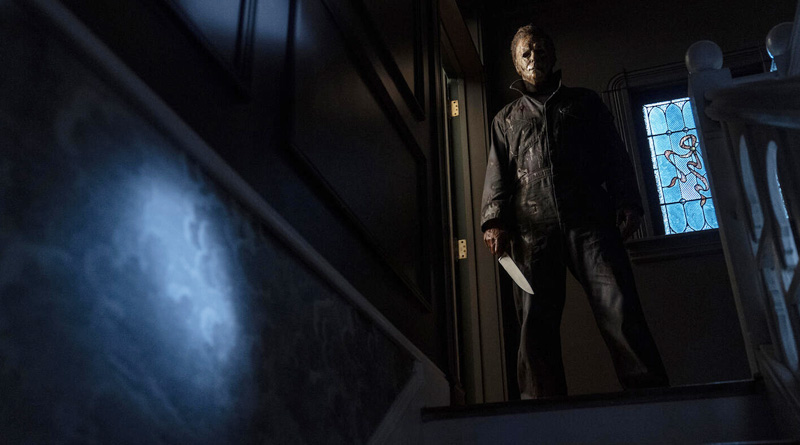Halloween Kills (2021) Review
Three years ago, indie auteur David Gordon Green did a great job reviving the flagging Halloween franchise with a better-than-expected 2018 sequel. Or more specifically, a legacy sequel to John Carpenter’s groundbreaking 1978 original. The 2018 version of Halloween did extremely well in the worldwide box office and even overtook the late Wes Craven’s Scream (1996) as the highest-grossing slasher film of all time.
Naturally, anticipation is high for the follow-up, which again reunites David Gordon Green and the OG scream queen of the Halloween franchise herself, Jamie Lee Curtis. The sequel — titled Halloween Kills — picks up where the 2018 film left off. Laurie Strode (Jamie Lee Curtis) along with her daughter, Karen (Judy Greer) and her granddaughter Allyson (Andi Matichak) thought they have defeated Michael Myers for good after trapping him in the basement and burned the house down. Well, in the classic tradition of a slasher film, Michael Myers somehow survived and escaped.
It doesn’t take long before the news spread all over Haddonfield about Michael Myers is still out there. One of the survivors, Tommy Doyle (Anthony Michael Hall) decided to form a mob to take down Michael Myers once and for all. Laurie Strode, in the meantime, is recuperating in the hospital after suffering from a serious injury in the previous film.

David Gordon Green, who also co-wrote the film with Danny McBride and franchise newcomer Scott Teems, could have gone the simpler and straightforward route. And that is setting up the story mainly in the hospital, which would be a fitting tribute to Rick Rosenthal’s 1981 sequel of Halloween II.
But they are more interested in approaching their follow-up in different directions. This includes fleshing out some of the supporting characters’ backstories, notably Will Patton’s Officer Hawkins during his younger days (played by Thomas Mann). His particular moment even stretches to an extended flashback sequence, with David Gordon Green going as far as addressing what really happened during that fateful night in 1978. As in the original ending of John Carpenter’s first film but with some newly-added scenes.
While I appreciate David Gordon Green’s attempt to expand its mythology beyond the whole Laurie Strode vs Michael Myers story angle, the added flashbacks tying the past and present events feel laborious. It even looks as if David Gordon Green can’t seem to let go of the past and feels the need to addressing them as much as possible. This, in turn, leaves the present-day events, as in the aftermath of 2018’s Halloween more like an afterthought. The result also sidelined Laurie Strode in Halloween Kills, reducing her into a glorified cameo appearance who doesn’t get to do much this time around, even though you could see she’s truly committed to her otherwise limited performance.

This is a pity because frankly, I’m interested in seeing more of her rather than the film chooses to scatter around by re-introducing various supporting characters from the past films, namely Tommy Doyle and Lonnie Elam from the original Halloween (both played Anthony Michael Hall and Robert Longstreet as the adult versions). It’s not that I’m against some of these supporting characters. It’s just that it would have been a wiser approach if David Gordon Green remains these supporting characters as, well, supporting characters and not turning them into a major plot point. If that’s not enough, the film also stalled its momentum by adding in filler scenes involving a pair of gay couples played by Scott MacArthur of TV’s short-lived The Mick and Michael McDonald.
Even if David Gordon Green is intended to subvert our expectations here, the film is still a mixed bag. Of course, there are some moments that work in its favour. For example, there is a scene where the angry mob get too carried away with their vigilante brand of justice to kill Michael Myers, only to cause an unnecessary death that turns them into monsters. Anthony Michael Hall made quite an impression playing the vengeful Tommy Doyle.
John Carpenter’s signature dread-inducing minimalist score, where he composed with Cody Carpenter and Daniel Davies, in the meantime, still resonates whenever it was heard in the background. David Gordon Green doesn’t shy away when comes to graphic violence and gore and here, we get to see everything from eyes being poked out with bare fingers to numerous brutal knife stabbings. For this department alone, Halloween Kills has them in spades with plenty of body counts to satisfy the slasher-genre fans.
Halloween Kills may have been a step-down from its superior 2018 legacy sequel. But at least David Gordon Green doesn’t just set out to make a cash-grab sequel that plagued most Halloween films at the time. Still, I hope he can step up his game upon wrapping up his trilogy in next year’s Halloween Ends.





